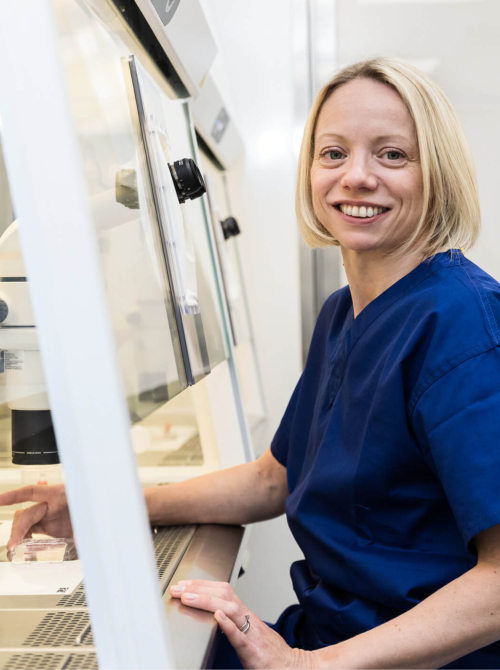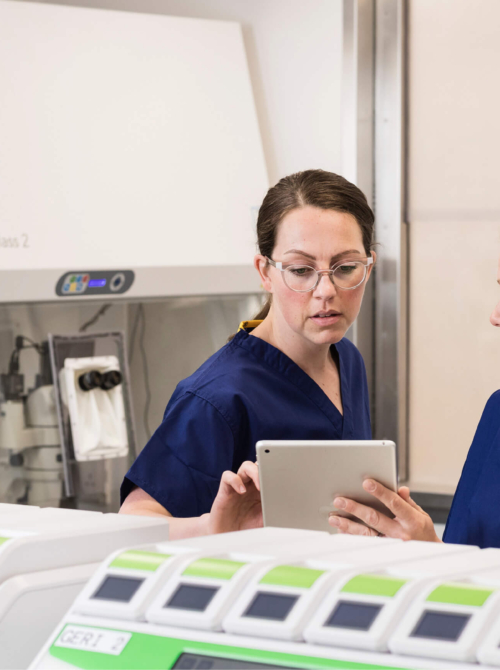How to prepare for an embryo transfer
Whether you’re having a fresh or frozen embryo transfer, understanding how to prepare can help you feel informed, supported, and empowered. Mr George Bakolas explains everything you need to know, including how to prepare for frozen embryo transfer specifically, and what to expect on the day of the procedure.
How to prepare for an embryo transfer.
If you’re approaching the final step in your IVF journey, you may be wondering exactly how to prepare for embryo transfer, both physically and emotionally. At The Evewell, we work with patients every day who are navigating this exciting yet nerve-wracking moment.
Whether you’re having a fresh or frozen cycle, understanding how to prepare your body for embryo transfer can help you feel informed, supported, and empowered. In this post, you can expect to find out how to prepare for an embryo transfer and what to expect on the day of the procedure.
What is an embryo transfer?
The embryo transfer is the final stage of IVF, where a fertilised embryo is placed into the uterus in the hope that it will implant and develop into a successful pregnancy. The transfer may take place shortly after egg collection (in a fresh cycle), or in a later cycle using previously frozen – or PGT-A biopsied embryos, known as a frozen embryo transfer (FET).
No matter the type of transfer you have, preparing your body beforehand plays a key role in supporting implantation and giving you the best possible chance of success.
How to prepare your body for embryo transfer
You will know what kind of transfer you’re having before your egg collection, but here’s how to take care of your physical and emotional health in the lead-up to embryo transfer:
1. Follow your medication plan carefully
Our team will provide a personalised treatment plan and medication schedule to help prepare the endometrial lining, the area in the uterus where the embryo needs to implant. If you’re having a frozen cycle, your medication may include oestrogen tablets or patches followed by progesterone. These help mimic the natural cycle and create the ideal hormonal environment to support pregnancy.
Following this schedule exactly – and watching any relevant videos – is one of the most important steps in how to prepare for either a fresh or frozen embryo transfer. Set reminders or use a medication tracking app if it helps, and never hesitate to ask questions if you’re unsure.
2. Support your body through lifestyle choices
Thinking about how to prepare your body for a fresh or frozen embryo transfer goes beyond medication. Your general health and wellbeing matter too. This also helps you feel more in control of the process, something we know a lot of patients worry about before the transfer.
We recommend:
- Eating a nourishing, balanced diet full of whole foods, good fats, lean protein, and lots of vegetables.
- Staying hydrated and reduce caffeine and alcohol consumption.
- Avoiding smoking, vaping and recreational drugs, which can negatively affect implantation and early pregnancy.
- And only practising gentle exercise like yoga, walking, or swimming, but avoiding high-intensity workouts. For more information, read our Can you Exercise During IVF? blog.
3. Manage stress and prioritise rest
The emotional side of IVF is often overlooked, but it’s completely valid to feel anxious, hopeful, or overwhelmed. Practising mindfulness, breathwork, or getting plenty of sleep, and seeking emotional support from friends, loved ones, or fertility counsellors can be incredibly helpful.
At The Evewell, we treat the whole person, not just the clinical process. We’re here to support your mental wellbeing at every stage.
We have lots of advice and support in our Support section of the website, and we regularly post tips on how to manage stress and anxiety – such as tips on what to expect in the Two Week Wait – on our Instagram.
Preparing for an embryo transfer
Your doctor will tailor your treatment plan to suit your body and circumstances, whether you’re using a fresh or frozen embryo.
If having a fresh transfer, you will be given instructions on what medication to continue or start following your egg collection, and you will be schedule for your transfer procedure on day five.
How to prepare for frozen embryo transfer
While the overall process is similar, how to prepare for frozen embryo transfer may involve slightly different medication or timing. Frozen cycles allow your body to recover from stimulation and may reduce certain risks. They also give more flexibility around timing.
You will receive a treatment plan from your doctor, along with proposed medication and instructions to call the clinic on Day One of your period, where the nursing team will book you in for a “baseline scan” on or around Day 8-10 to assess your endometrial lining.
That evening, you will be advised when to start your medication, and then every 2-3 days, you will need to attend the clinic to be scanned and possibly have bloods taken to check your progesterone level.
When your doctor thinks you are ready for transfer, you will be given clear instructions on what to do, if any further medication needs to be administered, and when to attend the clinic.
What happens during the embryo transfer?
Here’s what to expect on the day of your transfer:
1. A full bladder is usually needed
Having a full bladder helps to straighten the uterus and improve ultrasound visibility, making the procedure easier. You’ll receive instructions on how much water to drink and when to start.
2. The procedure is quick and painless
The actual embryo transfer is a relatively short, noninvasive procedure that usually lasts 10–15 minutes. It’s similar to a smear test, and no sedation is required. A thin catheter places the embryo into the uterus under ultrasound guidance.
You’ll be able to go home shortly after. There’s no need for strict bed rest, light activity is safe and encouraged.
3. Aftercare and the two-week wait
You’ll continue your progesterone medication and be given a date for a pregnancy test around 9–12 days later.
This period is known as the Two-Week Wait and can be the most emotionally challenging stage of your entire treatment. We’ve written a blog post on how to get through this here.
What can I do to improve the chances of an embryo transfer working?
Preparing for embryo transfer can feel like both the culmination and the beginning of your fertility journey. Understandably, many people want to know what else they can do to improve their chances of success. While there are no guaranteed outcomes, the best approach is to take it easy, avoid high-impact activities, and prioritise your emotional wellbeing.
Distraction can be helpful during The Two-Week Wait. Plan gentle, comforting activities that bring you peace, and try to resist the urge to test too early or analyse every symptom.
Whether you’re researching how to prepare your body for embryo transfer naturally or looking specifically at how to prepare for frozen embryo transfer, the message remains the same: trust your body, trust your treatment plan, and lean on your support network.
At The Evewell, we combine clinical expertise with compassionate care. We’re here to support you every step of the way, physically, emotionally, and medically.
If you have any questions about your upcoming transfer or want to speak to one of our fertility specialists, don’t hesitate to get in touch. We’re here to help you feel calm, confident, and ready.


